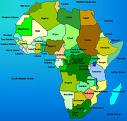MALI: France Pledges to Back Action to crush Mali Army Revolt

The French government, concerned at the destabilisation of Mali after the March 22 army coup that toppled President Amadou Toumani Touré (ATT), is signaling it will back military action to crush the revolt.
The Malian revolt developed among junior officers and men unhappy at the prospect of taking on well-armed Tuareg fighters entering Mali from Libya, where they fought for the regime of the late Colonel Muammar Gaddafi. According to the BBC, the coup enjoys some popular support in the south, where there has been “little sign of condemnation of the coup.” Shortly after the coup, the European Commission announced the suspension of development programmes for Mali.
RTBF (Belgian Francophone Radio-Television) reports a demonstration in Bamako, the capital of Mali, in support of the army revolt. Placards and banners read “Down with ATT,” “Down with France,” “Down with the international community.”
An April 1 summit of the heads of state of the Economic Community of West African States (ECOWAS) chaired by Ivory Coast President Alassane Ouattara discussed events in Mali. Ouattara took power with French army support last year during a brief civil war that toppled President Laurent Gbagbo. The summit demanded that rebel soldiers return to their barracks and threatened that if they failed to do so, it would implement a “total embargo” and establish a military strike force of roughly 2,000 men prepared to intervene.
Sanogo has pledged to call a “national convention” under the auspices of ECOWAS to organise the return to constitutional rule.
Participating at the summit opened by Ouattara were some ten heads of state and UN, French and US representatives—notably Yayi Boni, head of state of Bénin and president of the African Union, Saïd Djinnit, representing the UN in West Africa, and Alain Juppé, the French minister of foreign affairs.
Juppé declared: “The situation is deteriorating rapidly…we can help logistically or with training, but it’s out of the question to put French soldiers on Mali soil.”
Ouattara added that ECOWAS will use “all means to stop this rebellion and do what is necessary for Mali to recover its territorial integrity. It is a duty for the sub-region.”
The Belgian Radio/TV site RTBF reported yesterday: “France has submitted the matter to the UN Security Council….We wonder how it can intervene, both to prevent the partition of the country while making possible concessions to the separatist Tuareg rebellion, fight the Islamists and bring the junta in Bamako to heel.”
US State Department spokeswoman Victoria Nuland commented: “The United States urgently calls on all armed rebels in the north of Mali to cease military operations that compromise the Republic of Mali’s territorial integrity.”
It appears that France and its West African proxies are seizing the opportunity to strengthen their military presence in the region. In July 2010 France has seized upon reports of the execution of a French aid worker by Al Qaeda in the Islamic Maghreb (AQIM) to escalate its military intervention in its former colonies in the strategic Sahel region of Western Africa. (See: “France steps up military intervention in Sahel”)
Paris is particularly concerned that the March 22 coup led by Captain Amadou Haya Sanogo has opened the way for a Tuareg military offensive which has taken over the entire north of Mali. Tuareg separatist forces together with Al Qaeda-linked militia took over several towns of Mali’s northern desert regions and finally seized Timbuktu on Monday, after a 48-hour military operation. They encountered virtually no resistance from the Malian army.
The main Tuareg nationalist force, the Azwad National Liberation Movement (MNLA), has allegedly allied with AQIM to conquer the northern towns. The Islamists now wish to expel the MNLA from several towns, however, to impose sharia law in areas under its control. RTBF reports that “according to many sources, they took over Timbuktu. …The MNLA is secular and wants an independent Northern Mali and does not want an Islamic regime.”
Mali, a former French colony, gained its independence in 1960, but France has fought to maintain its hegemony in the Sahel. The Tuareg separatist rebellion began in the early 1990s. Tuaregs are a nomadic people numbering about 2 million persons, the historic inhabitants of the Sahel region in an area sprawling across Algeria, Burkina Faso, Libya, Mali, Mauritania and Niger.
Mali ranks 175th in the world in terms of wealth, but the northern regions where the Tuaregs live have not shared in even the limited development enjoyed by Mali’s south—where the capital, Bamako, is situated.
The region’s uranium is a critical interest for French imperialism. France’s nuclear industry—which supplies 78 percent of the country’s electricity generating capacity and makes at least €3 billion in yearly profits—relies on Niger for 25 percent of the 12,400 tonnes of uranium oxide concentrate that it consumes yearly.
France’s state-owned nuclear company Areva has exploited these uranium reserves for 40 years. It has invested €1.2 billion in the Imouraren deposit, which is expected to produce almost 5,000 metric tons per year for over 35 years.

